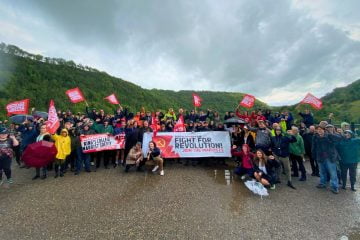I arrived at Marxism for one reason: my search for an alternative.
I’ve lived all my life, bar the period I spend studying at Swansea University, in the strong Labour constituency that is the Torfaen County Borough. This year is the 35th anniversary of the county’s inception, and it has spent the entirety of its lifetime in the hands of the Labour Party. It is an area in which always loyally returned Labour politicians to the Senedd and the House of Commons. Plaid Cymru and the Conservative Party usually pull in around the same number of seats, 2011 and 2016 being the only Assembly elections the Conservatives have edged Plaid. Yet they both still fall into the shadow of Labour’s gigantic hold over Wales.
Within the constituency, the community, and the country, everyone I personally know has spent decades of their lives under Labour governments. Yet almost everyone I personally know has been the victim of theft, drug-use, violence or poverty.
The hardest worker I have ever met is my own mother, whose most intense period of working life began the day I was born, and will end the day my brother is old enough to leave home. Under our current government, we are often told hard work pays off, but for my mother this couldn’t be further from the truth.
Year after year she is forced into a state of emotional distress months prior to, what is supposed to be the most joyous time of year, Christmas. She has found herself at the doorstep of food banks, on the rare occasions when they are present, to find some form of help for her family. Her life has been characterised by fluctuations between brief periods of comfort and long periods of struggle. This is completely unreflective of her consistent work ethic.
Likely due to the opinions and beliefs I was surrounded by, until I was around 16 years old I was an ardent liberal. I was a wholehearted supporter of the Obama administration and New Labour. I was heavily invested in the fight for social justice, anti-nationalism & anti-bigotry, but class struggle wasn’t yet on my agenda.
By the time I began attending college, I had learned a lot about Labour’s Clause IV policy and the Attlee government with its massive campaign for nationalisation:
“To secure for the workers by hand or by brain the full fruits of their industry and the most equitable distribution thereof that may be possible upon the basis of the common ownership of the means of production, distribution and exchange, and the best obtainable system of popular administration and control of each industry or service.”
The idea of common ownership over industry while simultaneously eliminating the drive for profits, putting the needs of the workers and the community as a whole first, was like blowing on the cinder of revolutionary aspirations I hadn’t yet realised I possessed. The next step was onto Marx and Lenin, as I quickly found myself reading through The Communist Manifesto and The Principles of Communism during my free time at college. I grew a habit of borrowing books from my local library on the Russian Revolution and learned about its aim to emancipate the toiling masses of Russia.
I finally realised that I had found my alternative. I realised that the best way to understand and fight for all kind of progress is through Marxist theory and militant socialist methods.
I had found my alternative. I had found the explanation for my mother’s situation. These are issues that will not be cured fundamentally or in the long-term through piecemeal reforms. Investment in food banks, ending the gender pay gap, greater ‘social mobility’: these things might partially resolve the problems for some people, which can only be a good thing. But for society as a whole, from a long-term point of view, these things are simply duct tape to fix a broken window.
In the recent period we have celebrated many important anniversaries – whether it is the October Revolution of 1917 or the French Revolution of 1968, they leave us with a goldmine of lessons, the most important one being that it is possible to change the world. Only through the socialist transformation of society as a whole, where the workers and communities run the daily affairs of their own lives, will we see this genuine emancipation of all the oppressed, not just in Britain, but throughout Europe, and throughout the world.
By 2017, on my way to Swansea University, I was burning for an organisation that could finally provide me with the foundations necessary to understanding Marxism and how to put it into practice in the student and labour movement. Through this, I found the International Marxist Tendency.
by Lewis Griffiths, Swansea Marxists




0 Comments